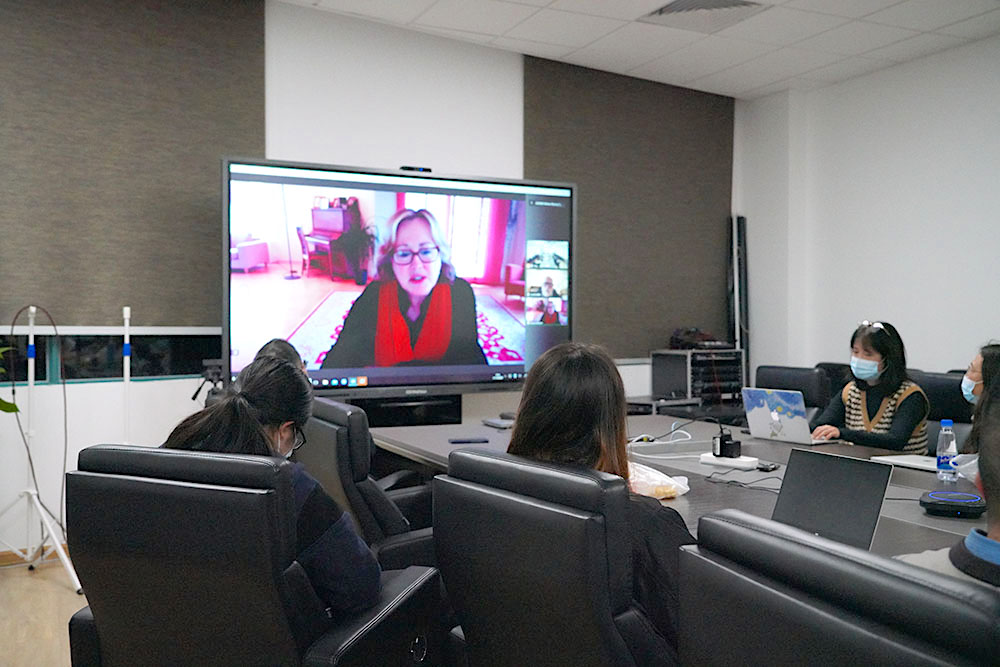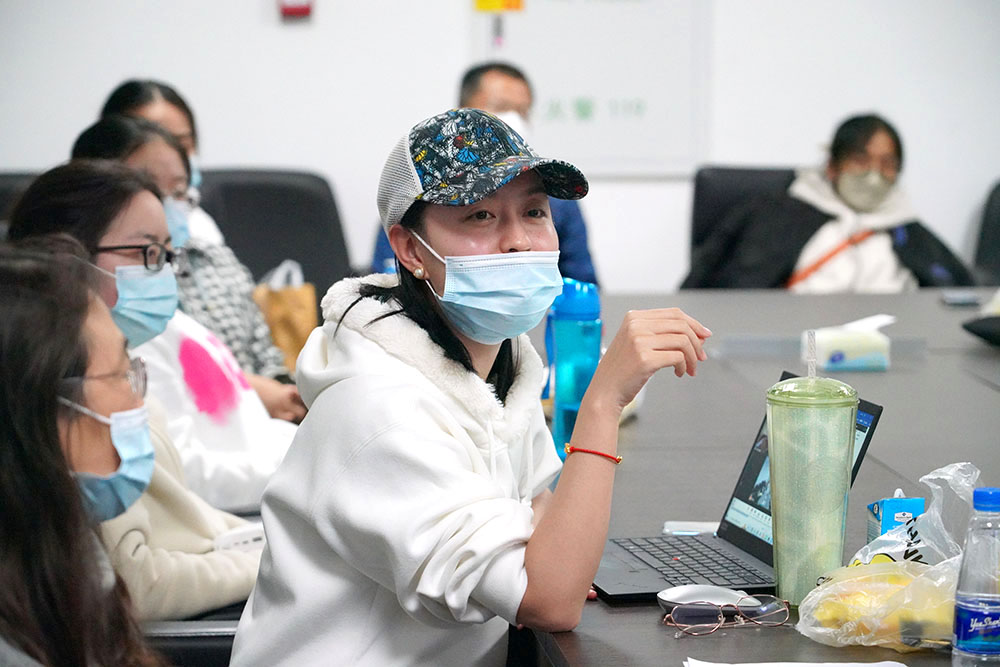The 14th Future Education International Salon, organized by the Future Education Institute, was held as scheduled on the evening of December 16th in conference room F301 of the LiJie Building. Through a combination of online and offline methods, teachers and students of the Future Education Institute, as well as Professor Sun Bo, Vice Dean of the Future Education Institute, were invited to participate in the event.
The keynote speaker for this salon was Professor Barbara Wasson, Director of the Center for Learning and Technology at the University of Bergen. The event was hosted by Professor Tore Hoel, a specially appointed expert for the National Foreign Experts Project at the Future Education Institute.

At the beginning of the event, Professor Barbara Wasson introduced the Center for Learning and Technology at the University of Bergen (SLATE), an international cutting-edge research institution funded by the Norwegian Ministry of Education. Its purpose is to help policy makers understand and master how to effectively use educational big data to support education, teaching, and knowledge construction.
In her keynote speech, Professor Wasson focused on the second phase of the "Assessment and Adaptation of Behavioral Data (AVT2)" project, which is funded by the Norwegian government alliance, led by the Oslo Education Committee, and specifically implemented by SLATE. The aim is to establish a recommendation learning analysis framework that can support adaptive teaching and learning resources.
Professor Wasson shared the progress of the project and the six research results obtained. The project developed subject maps (Norwegian Fagkartet) for various subjects such as mathematics, English, and Norwegian, providing subject tasks and learning skill guides for teachers, education workers, and education technology companies. The project also established a student electronic learning activity data core API and standardized the transmission format of XAPI activity data. The marking tool was updated to facilitate education service providers to mark tasks or activities based on subject maps. The project also developed an open learning application called "My subject Map" for students, teachers, and parents to display collected student data and show students' progress in various subjects. The project provided a solution for content search based on metadata tags (NS 4180) for the Norwegian Education and Training Bureau and developed infrastructure to explore new educational technology procurement schemes and payment models.
During the Q&A session of the salon, teachers and students of the Future Education Institute had exchanges and interactions with Professor Wasson. Young teacher Jin Yu was interested in the data collection and processing process of the project and hoped that Professor Wasson could further share how the project collected and processed data, especially how to collect data to evaluate improvements in language abilities. Professor Wasson responded that the project collected education data based on some adaptive teaching tools in Norwegian classrooms and understood the application and teachers' views of these tools, but there is currently not much data related to language abilities. Professor Tore Hoel added that the project's data focuses on understanding the changes in teachers' teaching methods in an intelligent environment. Compared with other countries and regions, Norwegian teachers have more teaching autonomy and can choose multiple adaptive teaching tools according to actual needs in classroom teaching. Professor Wasson made further supplements, saying that teachers in the city of Ashro in the project do have autonomy in choosing different tools, which invisibly pays more attention to the quality of teaching tools, putting higher demands on education technology companies.

Professor Sun Bo raised two questions: first, how do researchers at SLATE coordinate with complex education stakeholders such as manufacturers, governments, education workers, and students? Second, as researchers, how do they obtain relevant data when working with education technology manufacturers? Professor Wasson replied that their team has few members, each with different tasks and roles, but they have established good cooperation with all parties involved in the project. For example, they completed interviews with most teachers with the support and coordination of Oslo Education Department staff, and actively contacted different education technology manufacturers to carry out cooperative research, processed various data formats, and converted the data into the correct format required by the Ministry of Education. Specifically, the main service target of this project is teachers, and high-quality teaching tools are developed for the vast group of teachers. Therefore, the center's researchers spent a lot of time and energy understanding the real thoughts and needs of teachers. Researchers need to coordinate relationships in all aspects, promote cooperation and communication between governments and technology manufacturers, and jointly complete data collection.
Professor Wasson initiated a discussion about the impact of differences in data management and legal norms on different countries and cultures. What are the differences between China and Norway in terms of data collectors and sharers? Professor Sun believes that, like Norway, student learning data in China belongs to students and schools, not education technology companies. Technology companies only have limited rights to use the data and do not have ownership. Professor Wasson emphasized that ownership issues of some implicit data still need further discussion, such as some time-related data, specific times when users use a certain platform or tool, and other implicit data. She proposed that the management and ownership issues of such data are worthy of attention and discussion.
Finally, Professor Wasson mentioned that Norwegian students do not want their parents to monitor their every move in school through learning analysis tools. Professor Yuan Li believes that the situation in China is different. Parents are very concerned about their children's learning in school and hope that schools and teachers can share students' learning and progress in a timely manner. Therefore, their attitude towards the collection and management of learning data is more open, which provides space and possibilities for technology platforms and tools to collect and analyze student activity data. Professor Wasson stated that it is commendable for parents to want to know about their children's lives in school and provide help, but in a digital and intelligent educational scenario, it has raised a series of new issues. For example, in the past, students only brought math textbooks home, and parents understood the math problems their children encountered through the textbook. Now, through intelligent tools, all behaviors and performances of students during school can be recorded. Whether we need to share all data with parents, or which data to share, is a question worth exploring in the future.
The exchange and discussion ended with a lot of thoughts and expectations for the 2022 Future Education International Salon. Everyone looks forward to a more exciting salon in 2023, which will bring deeper thinking collisions and visions of future education to teachers and students.



 Last Page
Last Page

 Phone:0756-3621121
Phone:0756-3621121
 Email:ccie@bnu.edu.cn
Email:ccie@bnu.edu.cn